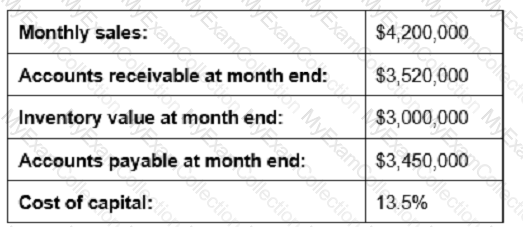Which of the following situations is most likely to occur when using a push system?
Which of the following methods would be appropriate for forecasting the demand for a product family when there is a significant trend and seasonality in the demand history?
A manufacturer has a forecasted annual demand of 1,000,000 units for a new product. They have to choose 1 of 4 new pieces of equipment to produce this product. Assume that revenue will be $10 per unit for all 4 options.
Which machine will maximize their profit if the manufacturer anticipates market demand will be steady for 3 years and there is no residual value for any of the equipment choices?
MachineFixed CostVariable Cost per UnitAnnual Capacity
AS100.000$6 00800,000 units
B$200,000$5 501.000,000 units
C$250,000$5 001,200,000 units
D$1 000.000$4 501 400.000 units
One of the benefits of Integrating a poka-yoke into the production process is that it can be used to:
Which of the following statements is true about total productive maintenance (TPM)?
Which of the following measurements indicates there may be bias In the forecast model?
Which of the following prioritization rules will have the greatest impact In reducing the number of orders In queue?
Which of the following factors typically would distort a sales forecast that is based solely on shipment history?
The trade-off of increasing safety stock to improve customer fill rate would be a decrease in:
The planned channels of Inventory disbursement from one or more sources to field warehouses are known as:
The costs provided in the table below are associated with buying a quantity larger than immediately needed. What Is the total landed cost based on this table?
Cost CategoryCost
Custom fees$125
Freight$700
Warehouse rent$200
Matenal cost$500
Which of the following techniques would a group use to prioritize problems?
The question below is based on the following standard and actual data of a production order

Which of the following statements about variances is true?
A manufacturer has a primary assembly line supported by output from several subassembly lines. Which of the following scenarios would be the best argument for a multilevel master scheduling process?
A work center has 3 machines that are all run at the same time with a single worker. The work center has an efficiency of 75% and a utilization of 100%. What is the work center's capacity in standard hours for an 8-hour shift?
Which of the following conditions is most likely to result in planned production that is greater than the total demand over the sales and operations planning (S&OP) horizon for a product family that is
made to stock?
Which of the following actions hinders the transition from a push system to a pull system?
Which of the following statements best characterizes enterprise resources planning (ERP) systems?
Which of the following statements characterizes a pull system In distribution management?
A reduction In purchased lot sizes will reduce which of the following items?
Reducing distribution network inventory days of supply will have which of the following Impacts?
Under which of the following conditions is excess capacity most likely a good substitute for safety stock?
The question below is based on the following information:

Work Center 1 has an available capacity of 1,200 hours per month. Which of the following amounts represents the cumulative difference between the required capacity and the available capacity of Months 1 through 3?
We have observed the inventory system does not handle plastic parts well." What should be added to the problem statement to make it more useful?
A company is having trouble with raw material deliveries and has decided to develop a supplier certification program. The certification process most appropriately would start with which of the following suppliers?
Given the information below, reducing which measure by 10% would contribute most to shortening the cash-to-cash cycle time?

Which of the following is the fundamental difference between finite loading and other capacity planning approaches?
Which of the following production activity control (PAC) techniques focuses on optimizing output?
Which of the following methods most likely Introduces a temporary variance between the inventory balance and the inventory record?
Which of the following trade-offs should be evaluated when determining where to place inventory in a multi-echelon supply chain network?
In a make-to-stock (MTS) environment, the master production schedule (MPS) Is usually a schedule of which of the following types of items?
A company can easily change Its workforce, but inventory carrying costs are high. Which of the following strategies would be most appropriate during times of highly fluctuating demand?



